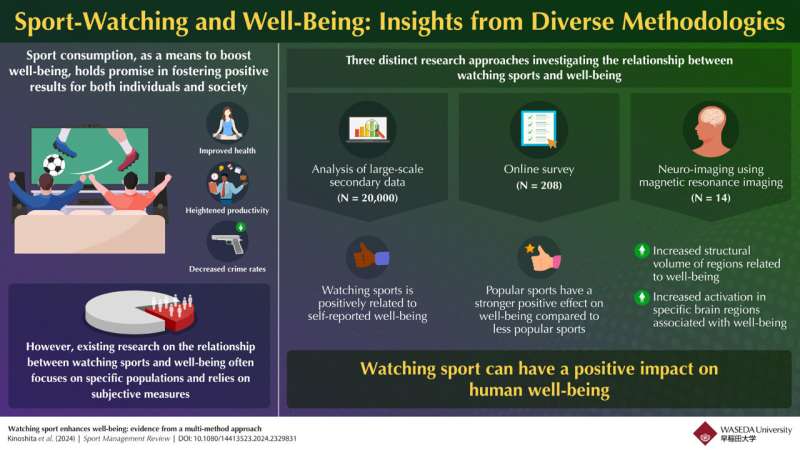This article has been reviewed according to Science X's editorial process and policies. Editors have highlighted the following attributes while ensuring the content's credibility:
fact-checked
trusted source
proofread
The joy of sports: How watching sports can boost well-being

For many individuals, sports have long served as a source of enjoyment and relaxation. Watching sports, particularly at large gatherings, goes beyond entertainment. It fosters a sense of community and belonging among audiences. This sense of connection not only makes individuals feel good but also benefits society by improving health, enhancing productivity, and reducing crime.
Although it is popularly recognized for its positive effects, existing studies on the relationship between watching sports and well-being offer only limited evidence.
Recognizing this gap, a team of researchers led by Associate Professor Shintaro Sato from the Faculty of Sport Sciences, Waseda University, Japan, embarked on a groundbreaking study.
Prof. Sato, alongside Assistant Professor Keita Kinoshita from Nanyang Technological University and Dr. Kento Nakagawa from the Faculty of Human Sciences, Waseda University, used a multi-method approach, combining secondary data analysis, self-reports, and neuroimaging measures to understand the connection between sports viewing and well-being in the general population.
"A significant challenge in well-being research is the subjective nature of measurement procedures, potentially leading to biased findings. Therefore, our studies focused on both subjective and objective measures of well-being," explains Prof. Sato. Their research was published in Sports Management Review.
In the first study, the researchers analyzed large-scale publicly available data on the influence of watching sports on 20,000 Japanese residents. The results of this study confirmed the ongoing pattern of elevated reported well-being associated with regular sports viewing. However, this study was limited by its inability to provide deeper insight into the relationship between sports consumption and well-being.
The second study, an online survey aimed at investigating whether the connection between sports viewing and well-being varied depending on the type of sport observed, involved 208 participants. The experiment exposed them to various sports videos, assessing their well-being both before and after viewing. The findings underscored that widely embraced sports, like baseball, exerted a more significant impact on enhancing well-being compared to less popular sports, such as golf.
However, the most innovative aspect of this research emerged in the third study. Here, the team employed neuroimaging techniques to scrutinize alterations in brain activity following sports viewing. Utilizing multimodal MRI neuroimaging measurement procedures, the brain activity of fourteen able-bodied Japanese participants was analyzed while they watched sports clips.
The results of this investigation illuminated that sports viewing triggered activation in the brain's reward circuits, indicative of feelings of happiness or pleasure. Additionally, a noteworthy finding surfaced in the structural image analysis. It revealed that individuals who reported watching sports more frequently exhibited greater gray matter volume in regions associated with reward circuits, suggesting that regular sports viewing may gradually induce changes in brain structures.
"Both subjective and objective measures of well-being were found to be positively influenced by engaging in sports viewing. By inducing structural changes in the brain's reward system over time, it fosters long-term benefits for individuals. For those seeking to enhance their overall well-being, regularly watching sports, particularly popular ones such as baseball or soccer, can serve as an effective remedy," comments Prof. Sato.
The study has profound implications and theoretical contributions to sports management literature. Existing literature has primarily focused on sports fans; however, this study has taken into consideration a larger general population irrespective of their relationship to sports consumption. This research can contribute significantly to sports management practices and policymaking for public health.
More information: Keita Kinoshita et al, Watching sport enhances well-being: evidence from a multi-method approach, Sport Management Review (2024). DOI: 10.1080/14413523.2024.2329831



















